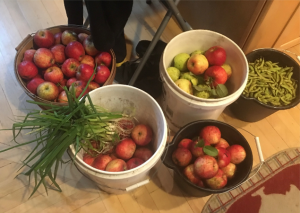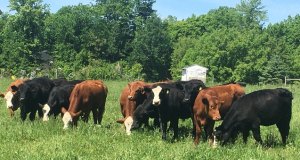• Why?
• What?
• Where?
• When?
• How?
So, you want to get started farming, but don’t know where to begin. Simple: start by lining up your vision, mission, values, and guiding principles. Be ready to answer these key questions before starting a business.
Wait a minute. Wait a minute. That’s fuzzy for me, and I’ve done it before (and even taught others how to do it).
Let’s back it up and simplify it even more. That is, if you are interested in starting a farming enterprise, you owe it to yourself to address the unsexy and boring—but straight-to-the-point—”who, what, where, when, and why?” Oh, and “how?”
You could even add a “how much?” and “so what?”
If you have thoughtful, well-researched answers, vetted by experts, for these ugly-duckling questions, then your odds of success will skyrocket.
Look Before You Leap
But most dreamers don’t. They want to jump right to the Backyard Chicken 101 class. Or keep watching more of the “Make $75,000 on a half-acre” YouTube siren videos. Or just keep grinding out V9.0 of the vision and mission statements. Or rush to buy seeds and chicks to get going and then post the entire journey on Facebook Live (TikTok, if you’re younger in spirit). And, while I strongly support piloting as soon as possible and admire an action mindset, how it is done matters.
Details matter.
Having solid answers to these “Five Ws” (and an “H”) will increase the likelihood of a successful backyard chicken enterprise or yield abundant fruits in your Food Forest. These questions are crucial for investigative reporters, police investigators, and, yes, people like you. Taking the time to answer them will be the best investment you can make as a beginning farmer.
Says Who?

So, here’s a “W” question we should address: Who am I to say that you should do this? Fair enough. As the Farmers Insurance commercial says, “We know a thing or two because we’ve seen a thing or two.” I’ve been engulfed in agriculture from all angles you can think of, and for more years than I want to admit.
I was born and raised on a 500-acre cattle, hog, chicken, corn, soybean, alfalfa, and grass pasture operation in Iowa. My family grew some of our own vegetables, had our own eggs, raised most of our own freezer meat, and drank raw milk before it became a “thang.” As a youngster, I raised 500 broilers to make money for college, and knew I wanted to be a farmer. My dad said, “No, you’re going to college… and you’re paying for it, too.” So, I did. And I didn’t stop until they handed me a doctorate degree in plant genetics and begged me to get off the campus.
I spent time working in agriculture in Europe on a grant. Then, I got a job with the “no-good,” large, ag conglomerates. I traveled to 28 countries learning a thousand different ways that crops are grown and food gets produced. I climbed the corporate ranks for 20 years, until life hit me in the face like a garden rake.
Finally, a (Fleeting?) Farm
Then, I started a farm, almost 30 years after I initially wanted. Eighty-three acres with pastures, woods, open farmland, buildings, and access to a big lake. Be still by beating heart!

Dealing with adult-onset ADHD, I wanted to do it all. And I’m not exaggerating. A curated list: cattle, sheep, goats, chickens, ducks, geese, dogs, cats (*takes a breath*), 16 types of fruit trees, hazelnuts, blueberries and raspberries, every vegetable adapted to Zone 3b, and even hops and bees and maple syrup and… well, you get the idea.
Then, I took a job with Extension, for the benefits. My wife, employed off the farm and the one with the insurance plan, was no longer a party to farm operations but was a party to a divorce.
I farmed for 14 years. Learned as much in the field as I learned in school. I made money, lost money, and—quite literally—almost lost the farm.
I’ve been employed at Extension now for 10 years, working with farmers with operations of all sizes and types. I’ve taught Small Farm Start-up School since 2015, serving more than 75 aspiring “wannabes” who entered the course with romance dancing in their eyes and left with reality stamped across their saddened, shrunken, hollowed-out faces. If I scared some of them away, then it was successful, because they probably weren’t ready. Many persevered, and a lot succeeded after a protracted start.
But most, if not all, successful entities answered the boring questions first. Then they built a solid business plan.
Back to School – Why do you want to farm?
In our Small Farm Start-up School at Sarasota County Extension, we spend extended time on the questions and the plan. And in this series, we will go through the list and explain what each question means in the context of starting a farm.
They might seem like simple questions, but they can profoundly impact the success of your business, as well as affect your personal life (remember my “divorce” thing?). “Who” is just three letters, after all, but ignoring it could be mega-catastrophic (16 letters, if you’re counting).
So, I usually start with the “who” question because that affects and molds the “why.” I’ve seen the faces of spouses who obviously aren’t comfortable with the “why” they just heard shared by their partner. If they can’t/don’t/won’t buy in to the “why,” then they may quickly go from being backers to balkers or better-half to bitter-half.
Starting with the “who,” if thoroughly defined and agreed upon by all parties, also CAN support and inform the other questions. We’ll also bounce between these powerful one-word questions, as their answers often are inter-related.
Starting with these simple questions, we hope to inform a meaningful business plan. To build a solid base for the venture. Our new-farmer incubator will accommodate that “do-it-now” urge, but let it develop it in a low-risk, high-learning way while keeping your family from changing the locks on you.
So, stay tuned for more on our fledgling incubator in Sarasota County.
Our next post will deep-dive into the “why,” as in: “Why do you want to farm?”
 10
10
